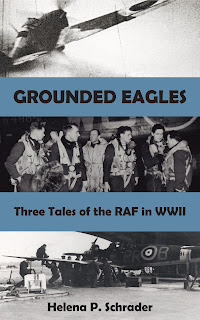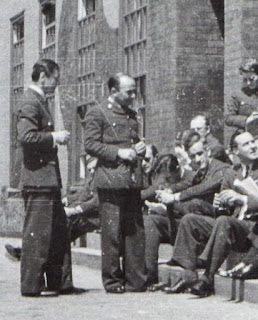"A Rose in November" is the second novella of the "Grounded Eagles" Trilogy. The term "lost generation" is traditionally used to characterize men who survived WWI at the price of losing their ideals and moral compass. Yet the other half of the "lost generation" were the women left behind by a war that had devoured the young men they would normally have married. Hattie Fitzsimmons is such a woman. Rather than despair or bemoan her fate, she sets out to make her life meaningful in the Salvation Army. The one thing she doesn't expect is to find love at 45.
Excerpt 1:
"I hope you don't mind me dropping in unexpectedly," Hattie started as she pulled off her hat and gloves.
"You know I don't! We've seen far to little of one another since I married." Emily had worked at the Seaman's mission, and she had met Robin when he came to see his aunt Hattie. Hattie liked to take credit for them meeting, but she would never have intentionally brought them together. Robin had been the kind of young man to go out with very glamorous girls, and Emily was not glamorous. "Shall I put the kettle on?" she asked. ... Emily produced biscuits from one of the cupboards and put them in front of Hattie. "Was there any particular reason why you called?"
Hattie's heart started to flutter and she felt silly. She thought of denying it, but she so desperately wanted to talk to someone about it. She just didn't dare meet Emily's eyes, so she busied herself arranging the biscuits on the plate Emily gave her. "What would you think if I said I'd been asked out to the flicks?"
"That's wonderful!" Emily exclaimed at once.
Hattie looked up at her sharply. "Don't you think its a bit ridiculous at my age?"
"Why? I mean, if you like him, if you want to go. Who is it?"
Hattie ignored the last question and concentrated on the rest. "Yes, I do like him. Very much. He must be about my age since he has a seventeen-year-old daughter. He's a widower of three years. He's candid and open-hearted. Yes I want to go to the cinema with him. But it seems very strange." She looked up at Emily uncertainly.
Emily -- bless her -- turned the kettle off as it started to whimper and sat down opposite. She looked at Hattie very seriously and stated with conviction: "I think you are one of the warmest people in the world and its a terrible pity that you haven't had anyone to share that with -- except Robin, of course. Its because you have so much warmth to give that you've been active in the Salvation Army. But you spend your time organizing and administering and paying bills -- well, taking care of all the business aspects. That's no substitute for personal affection. Finally, there is nothing ridiculous about two people caring about each other and wanting to be together at any age. I hope to God that Robin and I still feel affection for one another in our forties, fifties and sixties.
Hattie got up and gave her a heartfelt hug. "Thank you!"
Neither
a great beauty nor an heiress, Hattie never had the best cards in the
marriage market and by the end of WWI, she knew she is on her own, which was why she became active in the Salvation Army. Yet Hattie has another strike against her. AlthoughHattie is the daughter of a wealthy factory owner, she is the child of his second and scandalous marriage to a French dancing girl. In fact, she was born born out of wedlock and can still remember being called "the bastard" when she was small. Her father later married her mother, but her mother developed an alcohol problem and then abandoned her young family and disappeared. By WWI, Hattie, her sister Lydia and her father are living in "straightened circumstances" (for their class) but hardly in poverty. Hattie has been raised to be a "lady" and her expected future is a respectable marriage to a man of her class.
Her litter sister Lydia, however, is the pretty one. She is vivacious and flirtatious and captures the heart of a young navy officer. They marry in a whirlwind despite his parent's disapproval of Lydia, and then he's off to sea -- and death. Lydia is left behind a pregnant widow. Her son Robert -- Robin as he is known in the family -- is born after his father's death. Lydia has a small pension and the house in Southsea that he settled on her.
Hattie falls in love with an American officer, but he too is consumed by the war. So the sisters live together and jointly raise Robin -- until Hattie can't stand Lydia's silliness and complaints and criticism any longer an finds herself a small flat in Eastney. Meanwhile, the Salvation Army has become her life, and it is the "line of duty" -- serving out a hot meal from a mobile canteen at an airfield -- that she encounters Rhys Jenkins, an RAF Flight Sergeant. The attraction is immediate and mutual, but quite aside from Hattie's age, they are separated by class as well. Despite her dubious origins, her accent and her name put her in a different class from that of the coal-miner's son Rhys Jenkins. Hattie knows from their first encounter that her sister Lydia would be shocked and disapproving of any friendship with the Flight Sergeant.
But Lydia disapproves of nearly everything she does anyway, and Hattie no longer cares intensely about what Lydia thinks. The people that she needs to win over are Rhys' two teenage children -- and her own nephew and his new bride. The problems prove to be more than Hattie anticipated.
Excerpt 2:
"Don't you think you should tell us about the woman who left lipstick all over the towels upstairs?"
Rhys hand froze with the egg half-way to his mouth. Then he replaced his fork and sat back in his chair. Ellen was glaring at him furiously while Owain looked from his sister to his father in astonishment.
"Yes, Ellen, I do think I should tell you about her," Rhys managed to answer steadily. "In fact, I want you to meet her, but I thought we should have a little time just the three of us first."
"Just how long has this been going on?" Ellen demanded.
"I don't like that tone, Miss!" Rhys told her defensively. "I don't have to account to you!"
"No?" Ellen raised her eyebrows. She had never look so much like her mother, and Rhys lost his temper.
"No! Your mother has been dead for three years and she wouldn't let me into her bed for a hell of a lot longer than that! It's perfectly natural if I've found someone new. Most men would have found someone years ago -- whether they were married to your frigid mother or not!"
As soon as it was out, Rhys regretted it, but it was too late. Ellen gaped at him, and Owain giggled in embarrassment. Then Ellen jumped to her feet and ran out of the kitchen. He heard her run up the stairs and slam the door to her room. "Bloody hell," he muttered with a glance at Owain.
Owain shrugged his shoulders a little helplessly, but he seemed to be enjoying his father's discomfort too, as if it made his own arrest for shop-lifting a less serious offense.
With an oath, Rhys threw his napkin down beside his plate and went after Ellen. Standing outside the closed door of her room, he found himself trying to explain. "El, I'm sorry. I didn't mean to insult your Mum. I know she was a good woman. I never cheated on her. Not once in all our marriage. But you've got to understand, I'm - I'm not an old man yet. You and Owain aren't going to be around forever--"
"Now I know why you want me to go to some trade school! Why you want me to find a husband of my own! You want me out of the house so you can -- can have your affairs!
"That's not true! You know as well as I do that I've been begging you to go back to school for years. This has nothing to do with Hattie. And Hattie isn't an affair. I'm going to marry her."
Ellen answered with a wail of agony. Rhys looked about the narrow hall helplessly. This wasn't at all the way he'd imagined their fist day together in the beautiful cottage. He'd thought Ellen would be so pleased. She had been -- until she'd seen the wine glasses.
It was unfair. They hadn't even drunk any wine! And what if they had? Why shouldn't he have a little happiness? What right did Ellen have to make him feel guilty about the best thing that had happened to him in years? Why did she begrudge him his happiness? "Ellen! Stop that this minute!"
She wept more loudly.
Rhys looked around again. Owain was slouching at the foot of the stairs watching him. He grabbed the handle of Ellen's door and was astonished to find it was not locked. He went into the pretty bedroom with the flowery curtains framing the view of the bay. He had given Ellen the room because it was the prettiest in the cottage.
Ellen lay on her stomach, sobbing into her hands. Rhys took a deep breath and sat down on the edge of the bed. The soft mattress sagged under his weight. He stroked Ellen's shaking shoulders. "What are you so upset about, El? Don't you want your father to be happy? Don't I have the right to a little happiness after these last years?" He didn't manage to keep the resentment out of his voice.
"Why does your happiness depend on getting rid of me? What's so wrong with me? Why doesn't anyone want me around? Not even my own father! Everybody just wants to get rid of me. I wish I had never been born!"

they took the war to Hitler.
Their chances of survival were less than fifty percent.
Their average age was 21.
This is the story of just one bomber pilot, his crew and the woman he loved.
It is intended as a tribute to them all.
or Barnes and Noble.
 "This
is the best book on the life of us fighter pilots in the Battle of
Britain that I have ever seen.... I couldn't put it down."-- RAF Battle
of Britain ace, Wing Commander Bob Doe.
"This
is the best book on the life of us fighter pilots in the Battle of
Britain that I have ever seen.... I couldn't put it down."-- RAF Battle
of Britain ace, Wing Commander Bob Doe.
Winner of a Hemingway Award for 20th Century Wartime
Fiction, a Maincrest Media Award for Military Fiction and Silver in the Global Book Awards.
Find out more at: https://crossseaspress.com/where-eagles-never-flew
For more information about all my books visit: https://www.helenapschrader.com




.jpg)




